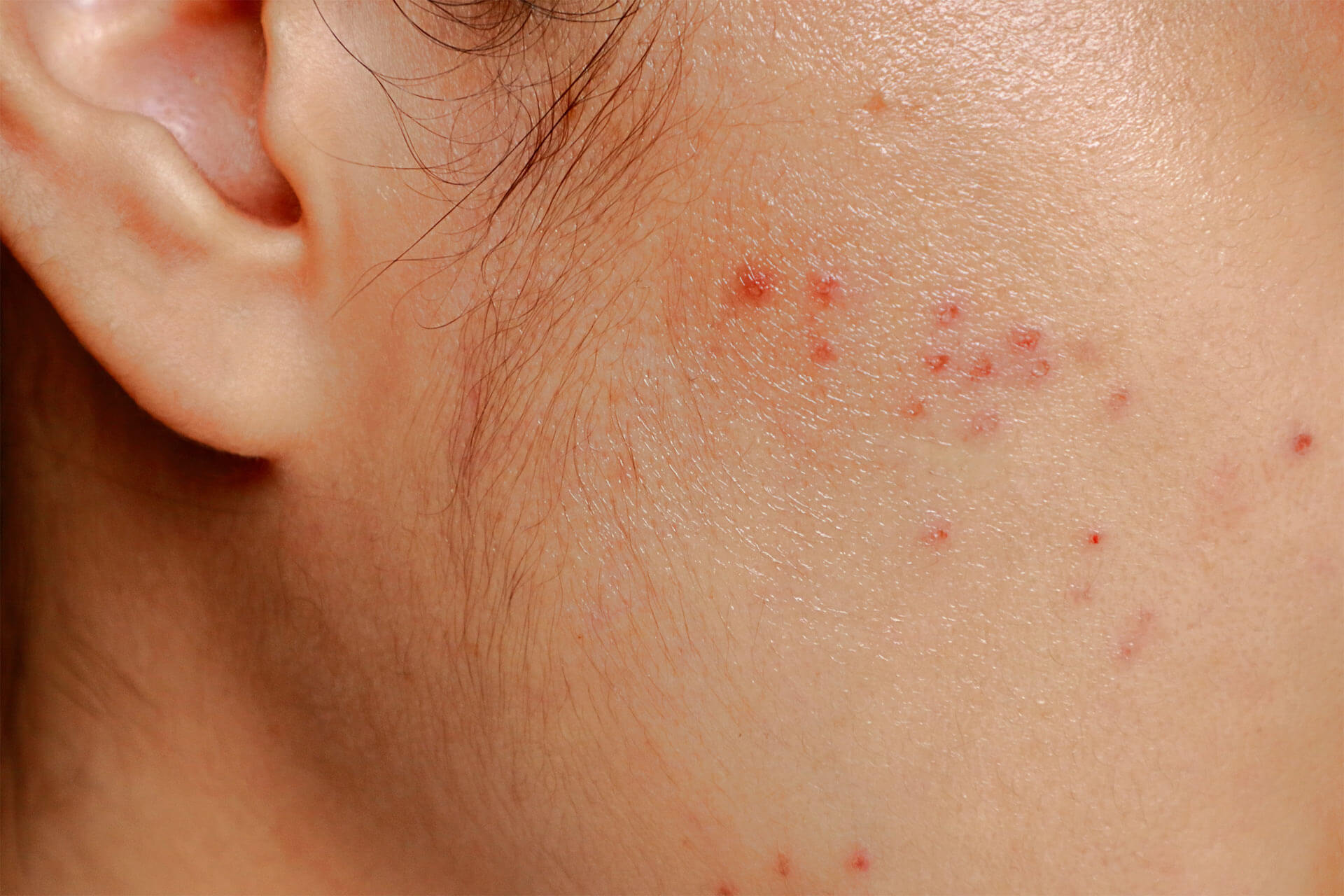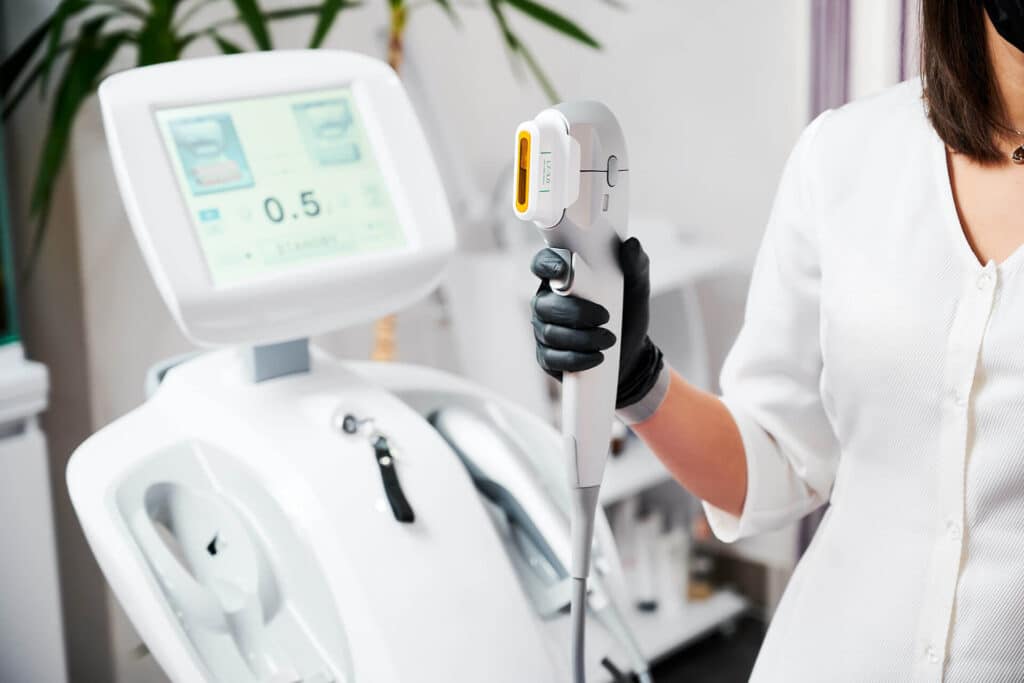At City Dermatology, our board-certified dermatologists in Bensalem and Warminster, Pennsylvania, specialize in diagnosing and treating acne for patients of all ages. Whether you’re a teenager dealing with frequent breakouts or an adult struggling with persistent acne, we’re here to help you achieve clearer, healthier skin. Our dermatologists use the latest acne treatments and personalized care plans to address the root causes of acne and prevent long-term scarring.
What Causes Acne Breakouts?
Acne develops when the sebaceous glands produce excess oil, which combines with dead skin cells to block pores. Bacteria known as Cutibacterium acnes (C. acnes) thrive inside these clogged follicles, causing inflammation and redness. Hormonal changes during puberty, menstruation, or pregnancy often increase oil production, leading to more frequent breakouts.
Other common triggers include certain medications, high-glycemic diets, and cosmetic products that clog pores. Stress and underlying hormonal imbalances, such as polycystic ovary syndrome (PCOS), can also worsen acne. Because acne can have multiple causes, professional evaluation is key to finding the most effective solution.
Advanced Acne Treatments in Bensalem and Warminster, PA
At City Dermatology, we offer a range of advanced acne treatments to reduce inflammation, control bacteria, and restore skin balance.
Topical treatments are often the first step, using ingredients like benzoyl peroxide, salicylic acid, or prescription-strength retinoids to clear pores and prevent new breakouts. Topical antibiotics such as clindamycin or erythromycin may be added to reduce bacteria and redness.
Newer topical medications such as clascoterone cream help regulate hormones within the skin, while minocycline foam provides targeted antibacterial effects with minimal irritation. For more persistent acne, oral medications or hormonal therapies may be prescribed to control oil production and inflammation.
In-office procedures such as microneedling, chemical peels, and laser or light therapy can improve active acne, minimize scarring, and smooth uneven skin tone. These treatments stimulate collagen, reduce bacteria, and fade post-inflammatory pigmentation for a clearer complexion.

Acne Scar and Adult Acne Treatment
Adult acne is increasingly common, particularly among women affected by hormonal changes or stress. Our dermatologists tailor gentle, effective treatment plans for adult skin to reduce breakouts and improve skin texture. For acne scars, we offer customized options including microneedling, laser resurfacing, and chemical peels to restore a smoother, more even complexion.
Clearer Skin Starts Here
Acne can be physically uncomfortable and emotionally frustrating, but it’s also highly treatable with professional care. Schedule an acne consultation at City Dermatology in Bensalem or Warminster, PA, to learn which treatment options are best for your skin. Our dermatologists are committed to helping you achieve lasting results and renewed confidence.
FAQs About Acne Treatment
Most patients begin to notice improvement within six to eight weeks, but consistent use of prescribed treatments is essential for long-term results.
While scars can’t always be completely erased, treatments such as microneedling, laser resurfacing, and chemical peels can significantly improve their appearance and texture.
If your acne is painful, causing scars, or not responding to over-the-counter treatments, it’s time to schedule an appointment with an acne specialist at City Dermatology.

Proudly Serving Patients Across Bucks County Townships and Northeast Philadelphia
We proudly serve patients from townships across Bucks County, including Bensalem, Bristol, Southampton, Feasterville, Langhorne, Middletown, Morrisville, Falls, and Levittown, as well as Northeast Philadelphia ZIP codes 19154, 19114, 19115, 19116, 19136, 19152, 19111, and 19149.
We also welcome patients from townships surrounding our Warminster location, including Warwick, Warrington, Doylestown, Buckingham, New Britain, Upper Moreland, Lower Moreland, Hatboro, Horsham, and Abington.
References
- Zaenglein, A. L., Pathy, A. L., Schlosser, B. J., Alikhan, A., Baldwin, H. E., Berson, D. S., … & Thiboutot, D. M. (2016). Guidelines of care for the management of acne vulgaris. Journal of the American Academy of Dermatology, 74(5), 945-973.
- Lucky, A. W., Biro, F. M., Huster, G. A., Leach, A. D., Morrison, J. A., & Ratterman, J. (1997). Acne vulgaris in premenarchal girls. Archives of Dermatology, 133(8), 1041-1044.
- Layton, A. M. (2009). The use of isotretinoin in acne. Dermato-endocrinology, 1(3), 162-169.
- Hebert, A. A., Thiboutot, D. M., Stein Gold, L. F., Webster, G. F., & Leyden, J. J. (2020). Efficacy and safety of topical minocycline foam for moderate-to-severe acne vulgaris: A randomized, double-blind, vehicle-controlled study. Journal of the American Academy of Dermatology, 82(3), 832-835.
- Gold, M. H., Andriessen, A., Biron, J. A., & Garassino, M. C. (2016). Light-based therapies in the treatment of acne vulgaris. Dermatologic Surgery, 42(3), 349-357.
- Shah, S. K., Alexis, A. F., & Resh, W. (2017). Topical dapsone in acne: Overview and safety profile. Journal of Clinical and Aesthetic Dermatology, 10(1), 34.
- Fabbrocini, G., Annunziata, M. C., D’Arco, V., De Vita, V., Lodi, G., Mauriello, M. C., … & Monfrecola, G. (2009). Acne scars: Pathogenesis, classification and treatment. Dermatology Research and Practice, 2009.

